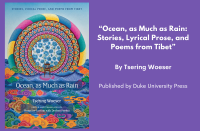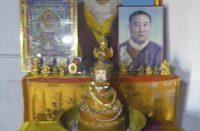
Ngawang Dorje, also known as Agvan Dorjiev, is a Buryat Mongolian, a “Geshe Lharampa” Lama from Drepung Monastery; he used to be a Minister of the Kashag and acted as a diplomat under the 13th Dalai Lama.
High Peaks Pure Earth has translated a blogpost by Woeser written in August 2014 for the Mandarin service of Radio Free Asia and published on her blog on August 19, 2014.
This post looks at the fascinating historical figure of Buryat Lama Ngawang Dorje, also known as Agvan Dorjiev.
Was the Diplomat of the 13th Dalai Lama A “Russian Spy”?
By Woeser

Not long ago, I was fortunate to get to know a few Tibetologists from Buryatia (Russia) who were all of Mongolian ethnicity; they were researching Tibetan history, Tibetan medicine, traditional Tibetan Buddhism and Tibetan language. I admired them for their ability to not only speak Buryat Mongolian and Russian, but also English, Tibetan, and Chinese.
During our conversation, I learnt that Moscow also has a University like the “Minzu Universities” in Beijing, Chengdu, Lanzhou and so on; their Russian equivalent could be translated into “Ethnic Friendship University”. The youngest of the scholars said jokingly that it was only after he had entered this “Ethnic Friendship University” that he realised the existence of various non-friendly ethnic sentiments. Even though Buryatia is called an “Autonomous Republic”, it is said to be very similar to the Tibet Autonomous Region (but of course the Buryatia Autonomous Republic holds a great deal more power than the TAR). Out of the one million inhabitants, Buryat Mongolians only make up around 30%, the remaining 70% are Russians. The lingua franca is Russian. Buryat Mongolians basically only speak their mother tongue at home.
The Tibetologist Nikolay Tsyrempilov gave me his book about the 13th Dalai Lama and the famous Buryat Lama Ngawang Dorje that he had written with the Tibetan scholar Jampa Samten and published in English and Tibetan as a present. It includes the many letters that His Holiness the 13th Dalai Lama and Ngawang Dorje exchanged.

Ngawang Dorje, also known as Agvan Dorjiev, was a Buryat Mongolian, a “Geshe Lharampa” Lama from Drepung monastery; he used to be a Minister of the Kashag and acted as a diplomat under the 13th Dalai Lama. He was entrusted to compile the first draft of the famous “Tibet Mongolia Treaty” that was signed on December 29, 1912; he was one of the Tibetan representatives who signed the treaty that declared the Tibetan and Mongolian independence from the Qing government and broke off all political relations with China.
The Mongolian writer, Daxi Dongribu, who lives in Japan, wrote in his essay “The Tibetan-Mongolian Past”: “In this treaty, Tibet and Mongolia proclaim mutual recognition, the preface stipulates: ‘Given that Mongolia and Tibet have already broken away from the Manchurian dynasty, are separated from China, and have become independent countries, and given that both countries share the same religion, with the aim of strengthening the two country’s historic mutual friendship…’ the following articles explicitly specify friendship, mutual help, the intimate friendship between two Buddhist countries, trade relations etc. The document makes occasional use of the Tibetan word ‘Rangzen’ which means ‘independence’.”
The Tibetan writer Jamyang Norbu, in his article “A brief overview of events that led to the 13th Dalai Lama’s Proclamation of Tibetan Independence”, called Ngawang Dorje “a seminal figure in bringing about the reformist and nationalist awakening in the court of the young Dalai Lama, but has by and large been overlooked.”
The 14th Dalai Lama says in Thomas Laird’s “The Story of Tibet: Conversations with the Dalai Lama” that Ngawang Dorje “was in fact an outstanding scholar and pious Buddhist monk, and he was always loyal to the 13th Dalai Lama.”
Ngawang Dorje was persecuted by Stalin and died in 1938 at the age of 84.

The Chinese government always has hated Ngawang Dorje (whose Chinese name is De Erzhi), labelling him as a “Russian spy” who “illegally signed the ‘Tibet Mongolia Treaty’ declaring the ‘separation of Tibet and Mongolia from China, splitting up the country and founding two independent nations’”. The Chinese government has been vehemently rejecting and vilifying Ngawang Dorje. Interestingly, the Chinese political scientist and constitutional scholar Zhang Boshu who currently resides in the US, in his most recent book “The Tibet Issue in China’s Democratic Transition”, adopts a very similar language to the CCP, calling Ngawang Dorje a “Russian spy who used Buddhism to gain the Dalai Lama’s trust”, and quoted large parts of the biggest social scientific project to revise Tibetan history, “The History of Tibet–Turquoise Beads”, showing that he entertains exactly the same viewpoint as the CCP.
The famous international Tibetologist and professor at Indiana University, Elliot Sperling, cannot help but laugh about the CCP’s and Zhang Boshu’s misrepresentations of Ngawang Dorje’s life story: “If Ngawang Dorje had really been some kind of ‘special agent’, then he must have been a special agent of the 13th Dalai Lama. It is true that he implemented Russian policies, but he did so for the advantage of Tibet and not as part of a Tsarist Russian conspiracy. Tibet was at the time facing the invasion of the British Empire. Russian politics were naturally directed at containing the British Empire; and when the Dalai Lama was in Mongolian exile he also entered into a political dialogue with Tsarist Russia.”
It is, however, strange that the Central Tibetan Administration’s department in charge of communications with the Chinese world, regards a nationalist scholar like Zhang Boshu as an important person “increasing Chinese people’s truthful knowledge about the current Tibetan question”.
August 2014






Follow Us!